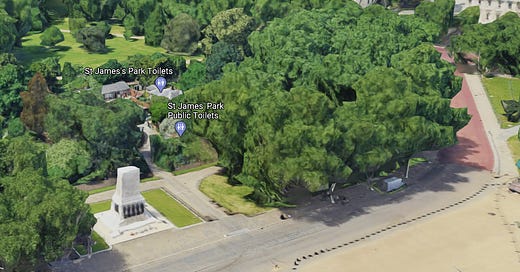This is the public lavatory in St James’s Park, a former swampland off Whitehall that was first drained and laid out as parkland by James I in 1603. Its specific location in the centre of London put it at the nexus of power in the early twentieth century. To its east is Whitehall, the home of the British civil service and the nerve centre of the Empire. To its west is Buckingham Palace, the home of the Royal Family. It is bordered on the north by the cultural centre of London’s theatre district, the Haymarket, the private members clubs of St James’, and the hub of London’s seedier nightlife, Soho. To the south are the Wellington Barracks, home to the Guards, a barrackhouse of young, often working class men. In the daytime nursemaids and governesses would take their young charges to feed the pelicans who inhabit the park, and couples might stroll on their lunch break under the weak, wintery sun. At night the park, like the near by Hyde Park, because a lagoon of darkness amongst the brightly lit, tightly packed streets that surround them, a darkness which, amongst the bushes and public toilets, became a place where homosexuality could no just exist, but prospered. At night, the parks of London could became queer spaces.
Ian Harvey was the Conservative MP for Harrow East, privately educated, a graduate of Oxford University, and had sat on a Parliamentary committee that worked to crack down on homosexuals in the British Armed Forces. He was caught in the bushes of St James Park with his trousers down by a park warden one freezing November night in 1958, engaging in an act of gross indecency with a 19 year old guardsman, Anthony Plant of the Coldstream Guards. It cost him his job as Parliamentary Under-Secretary of State at the Foreign Office, and his seat in Parliament. When told, Winston Churchill remarked, “On the coldest night of the year? It makes you proud to be British.”
Queerness has always been, for the British security services, both a risk and a recruiting sergeant. Recently, Félix del Campo and Alex Stoffel invited me to present a talk as part of Rabbles, an online video series with queer researchers, writers, and activists. I used the toilets of St James’s Park as the starting point for a virtual survey of London in the middle decades of the twentieth century, discussing the complex relationship between homosexuality, class, and the British state security services. I then joined Félix and Alex for a great conversation going further into the topic. They’ve very generously allowed me to present the entire talk and discussion here: I hope you enjoy it!
I was so excited to be asked to talk as part of Rabbles. It’s a fantastic new platform for in-depth discussions on class politics and queerness. They’ve told me that future discussions will cover family abolition, sexual liberation, gay marriage, and more — featuring guests like Sophie Lewis, Yasmin Nair, and Max Fox. You can subscribe to their channel here.
Subscribers to this newsletter might be aware that this subject is a favourite of mine, and the talk with Rabbles was a presentation of some of the ongoing research I’ve been doing on espionage and homosexuality in the British imagination. In fact, last year I posted an essay on it here, for my paid subscribers. I’ve now unlocked that essay, The Swallow’s Nest: if you’re interested in further reading of the subject, please do take a look. It’s also a sneak peek at the sort of essays I write for paid subscribers so if you’d like more of this sort of stuff, please do consider a subscription to utopian drivel!
Thank you so much for reading this free dispatch from utopian drivel. If you’d like to read/hear more from me (well there’s nowt so queer as folk), here’s some things I’ve done recently:
I recently wrote an essay on the work of photographer Robin Hammond for the book New Queer Photography, alongside essays by Ben Miller and Edna Bonhomme, amongst others. The book is out now from Verlag Kettler.
Last week I chatted about mediated culture, queer realities and psychotropic drugs for the art podcast AQNB. There’s a preview here, although I think the full podcast is for patreon followers only I’m afraid.
For the Autumn issue of Tribune, I wrote about how the photobook Soviet Visuals, borne from the twitter account of the same name, tells us far more about the consumption of images on the internet than it does about Soviet culture or history.
Lastly, a project from the heart. For the past year or so I’ve been involved in establishing a new arts centre in Barcelona. It will bring together a whole bunch of amazing projects including Cordova, Jokkoo, a collective whose work investigates and diffuses sound(s) from the African diaspora; and Saliva, a platform dedicated to exploring text and the various ways it can exist. It will also host two new educational programmes: Foc Forma, an experimental learning structure and a studio complex for artists, writers and more; and Sandia: an art program developed for LGBTQ+ youth. We’re currently in the renovation phase (tomorrow afternoon you’ll likely find me covered in paint!) but we’re currently fundraising to help open as soon as the pandemic restrictions allow. There’s a kickstarter here with a tonne of amazing rewards, including music, loads of amazing posters from some of my favourite artists, dinner at the space, and clothing. If you’re so inclined, please do consider supporting a really exciting, diverse new space!



